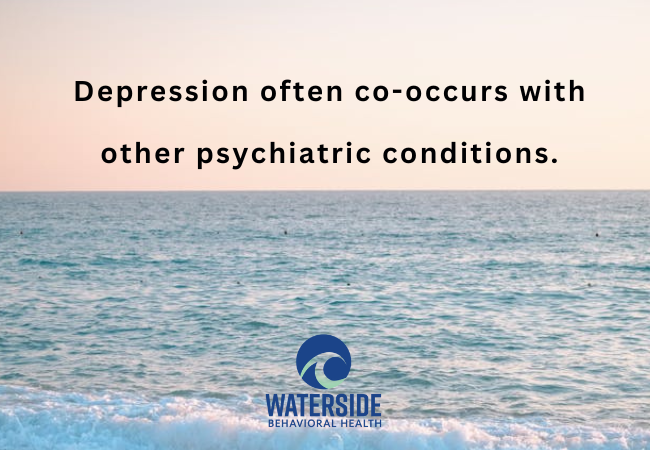Depression is a serious and complex mental health condition that affects millions of people globally. It is more than just feeling sad—it is a persistent disorder that can impact thoughts, emotions, behaviors, and even physical health. Depression can make even the simplest daily tasks feel overwhelming and, if left untreated, can lead to severe consequences, including chronic health problems and suicidal thoughts.
However, depression is treatable, and individuals who seek the right help can recover and regain control over their lives. At Waterside Behavioral Health, we provide comprehensive mental health treatment programs in Massachusetts, including Cognitive-Behavioral Therapy in Massachusetts (CBT), Dialectical Behavior Therapy in Massachusetts (DBT), and Trauma Therapy in Massachusetts to help individuals overcome depression and find lasting relief.
This guide will explore the causes, symptoms, and most effective treatment options for depression, along with lifestyle changes that can support the healing process.
What Is Depression?
Depression, also known as major depressive disorder (MDD), is a serious mood disorder that affects how people think, feel, and behave. Unlike temporary sadness, depression is a long-lasting condition that interferes with daily life and reduces overall well-being.
Different Types of Depression
Depression is not a one-size-fits-all condition. It can manifest in different forms, including:
- Major Depressive Disorder (MDD) – Persistent and severe depressive symptoms that last for at least two weeks or longer.
- Persistent Depressive Disorder (Dysthymia) – A chronic form of depression lasting two years or more, with periods of mild to moderate symptoms.
- Bipolar Disorder (Manic Depression) – Characterized by alternating episodes of depression and mania (extreme mood highs).
- Postpartum Depression – Depression that occurs after childbirth, often due to hormonal changes and emotional stress.
- Seasonal Affective Disorder (SAD) – Depression that follows a seasonal pattern, often worsening in fall and winter due to reduced sunlight exposure.
- Psychotic Depression – A severe form of depression that includes delusions or hallucinations.
Regardless of its type, depression can be effectively treated with professional help.
Causes of Depression
Depression is a complex condition with multiple contributing factors. These factors can be biological, psychological, and environmental.
1. Biological Factors
- Brain Chemistry Imbalances – Neurotransmitters like serotonin, dopamine, and norepinephrine play a significant role in regulating mood.
- Genetics – Individuals with a family history of depression are at a higher risk.
- Hormonal Changes – Conditions such as thyroid disorders, pregnancy, or menopause can contribute to depressive symptoms.
2. Psychological Factors
- Negative Thinking Patterns – Persistent negative thoughts and low self-esteem increase vulnerability to depression.
- Unresolved Trauma – Childhood abuse, neglect, or significant life stressors can lead to long-term emotional distress.
- Personality Traits – Individuals who are highly self-critical, perfectionistic, or sensitive to stress may be more prone to depression.
3. Environmental and Lifestyle Factors
- Chronic Stress – Financial problems, job-related stress, and relationship conflicts can trigger depression.
- Social Isolation – Lack of a strong support system or feelings of loneliness can contribute to depressive symptoms.
- Substance Abuse – Excessive alcohol or drug use can increase the risk of developing depression or worsen existing symptoms.
Understanding the root causes of depression can help individuals and therapists develop personalized treatment strategies for lasting recovery.
Signs and Symptoms of Depression
Depression affects each person differently, but common emotional, physical, and behavioral symptoms include:
Emotional Symptoms
- Persistent sadness, emptiness, or hopelessness
- Loss of interest in previously enjoyable activities (anhedonia)
- Feelings of guilt, worthlessness, or excessive self-blame
- Increased irritability, frustration, or anger
- Difficulty concentrating, making decisions, or remembering details
Physical Symptoms
- Chronic fatigue or low energy
- Sleep disturbances (insomnia or excessive sleeping)
- Appetite changes (significant weight loss or gain)
- Unexplained aches, pains, or digestive issues
- Slowed movements or speech
Behavioral Symptoms
- Social withdrawal or isolation
- Avoiding responsibilities at work or home
- Increased alcohol or drug use
- Engaging in self-harm or suicidal thoughts (seek immediate help if this occurs)
If you or someone you know is experiencing severe or persistent depression symptoms, it is essential to seek professional help at a mental health treatment center in Massachusetts.

Effective Therapies for Depression
At Waterside Behavioral Health, we provide a variety of evidence-based therapies to help individuals manage and recover from depression.
1. Cognitive-Behavioral Therapy (CBT)
CBT is a highly effective treatment for depression that focuses on identifying and changing negative thought patterns.
CBT Techniques Include:
- Cognitive Restructuring: Replacing negative thoughts with rational, healthier beliefs.
- Behavioral Activation: Encouraging positive activities and engagement to improve mood.
- Problem-Solving Therapy: Teaching practical strategies for handling life stressors.
Our Cognitive-Behavioral Therapy in Massachusetts program helps individuals take control of their thoughts and develop long-term coping skills.
2. Dialectical Behavior Therapy (DBT)
DBT is particularly useful for individuals struggling with severe emotional distress and mood instability.
DBT Techniques Include:
- Mindfulness exercises to improve emotional awareness.
- Distress tolerance skills to handle overwhelming emotions.
- Interpersonal effectiveness to improve relationships.
Our Dialectical Behavior Therapy in Massachusetts program is designed to help individuals develop emotional resilience.
3. Trauma Therapy for Depression
For those whose depression stems from past trauma, trauma-focused therapy can be life-changing.
Trauma Therapy Approaches Include:
- Eye Movement Desensitization and Reprocessing (EMDR) to reprocess traumatic memories.
- Exposure Therapy to reduce fear responses associated with past experiences.
- Narrative Therapy to reshape the personal meaning of traumatic events.
Our Trauma Therapy in Massachusetts program helps individuals heal from past experiences and move forward with confidence.
4. Medication Management
For moderate to severe depression, antidepressants may be recommended alongside therapy. Common options include:
- Selective Serotonin Reuptake Inhibitors (SSRIs) (e.g., Prozac, Zoloft)
- Serotonin-Norepinephrine Reuptake Inhibitors (SNRIs) (e.g., Effexor, Cymbalta)
Medication is most effective when combined with therapy and lifestyle changes.
5. Lifestyle Changes and Holistic Approaches
- Regular Exercise: Boosts mood and increases serotonin levels.
- Healthy Diet: Supports brain function and mental health.
- Sleep Hygiene: Establishing a consistent sleep routine.
- Support Groups: Connecting with others who understand the struggle.
Find Hope and Healing at Waterside Behavioral Health
If you or a loved one is struggling with depression, help is available. At Waterside Behavioral Health, we offer personalized depression therapy in Massachusetts, providing the tools and support needed to regain control of life. Call 774.619.7750 today to learn more about our mental health treatment programs in Massachusetts and start your journey to healing. You are not alone—recovery is possible.
Frequently Asked Questions About Depression
What is depression, and how is it different from sadness?
Depression is a serious mental health disorder that causes persistent feelings of sadness, hopelessness, and loss of interest in activities. Unlike temporary sadness, depression lasts weeks to months and interferes with daily life.
What causes depression?
Depression can be caused by a combination of biological, psychological, and environmental factors, including:
- Brain chemistry imbalances (low serotonin, dopamine)
- Genetics (family history of depression)
- Chronic stress and trauma
- Hormonal changes (postpartum, thyroid issues)
- Substance abuse
What are the most common symptoms of depression?
Depression symptoms vary, but may include:
- Persistent sadness, hopelessness, or emptiness
- Fatigue or lack of motivation
- Changes in sleep and appetite
- Loss of interest in hobbies and social activities
- Difficulty concentrating
- Suicidal thoughts (seek help immediately if experiencing this)
How is depression diagnosed?
A licensed mental health professional diagnoses depression through clinical evaluations, including:
- A detailed discussion of symptoms and history
- Psychological assessments
- Identifying possible co-occurring disorders (such as anxiety)
What are the best treatment options for depression?
Effective depression therapy in Massachusetts includes:
- Cognitive-Behavioral Therapy (CBT) – Changes negative thought patterns.
- Dialectical Behavior Therapy (DBT) – Helps regulate intense emotions.
- Trauma Therapy Program – Treats depression linked to past trauma.
- Medication Management – May include SSRIs or SNRIs if needed.
Can therapy alone treat depression, or is medication necessary?
For mild to moderate depression, therapy alone is often effective. For severe cases, a combination of therapy and antidepressants can provide the best results. If a loved one is suffering from depression, you may want to check out our dedicated post How to Help Someone with Depression.




